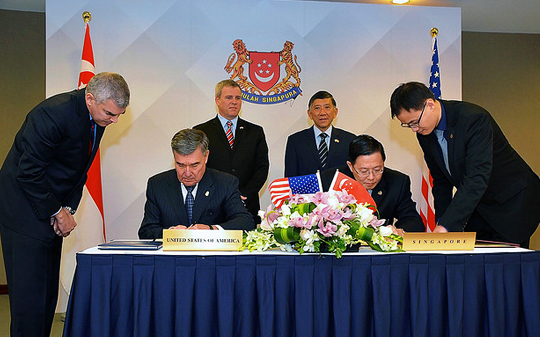
CBP Commissioner R. Gil Kerlikowske and Singapore Customs Director General Ho Chee Pong sign a U.S.– Singapore CMAA and MRA between CBP and Singapore’s Customs’ Secure Trade Partnership.
(Photo by: U.S. Department of State)
Customs and Border Protection (CBP) recently announced the signing of a mutual recognition agreement and a Customs Mutual Assistance Agreement (CMAA) between Singapore and the United States, effective as of December 1, 2014.
A mutual recognition agreement between the United States’ C-TPAT program and another country’s customs program—in this case Singapore’s Secure Trade Partnership (STC)—certifies that the foreign customs program’s requirements, regulations, and security standards are similar to those of C-TPAT, and produces benefits for companies operating in the mutually recognized countries.
A Customs Mutual Assistance Agreement establishes and facilities increased information-sharing between the two countries, allowing partners in the CMAA to more easily and effectively enforce their customs laws.
The institution of a mutual recognition agreement, as well as a CMAA between the U.S. and Singapore allows the processes pertaining to importing and exporting between the two countries to become more simplified, while also enabling both countries to better regulate their customs processes, respectively.
Additionally, mutual recognition agreements and CMAAs result in their own set of benefits. Partners in mutual recognition agreements enjoy the following benefits as a result of each country acknowledging the similarities between its own customs program and that of its partner country:
- Faster validation process
- Fewer exams on cargo
- Common security standards
- Higher level of customs efficiency
- Front-of-the-line processing
- Marketability
At the same time, partners in a CMAA are better able to protect themselves from the negatives associated with trade, such as terrorism-related events/activities, trafficking, money-laundering, duty evasion, and proliferation because of the increased communication between partner countries that a CMAA establishes.
The U.S. also has mutual recognition agreements with the following Supply Chain Security programs: New Zealand, Canada, Japan, Korea, Jordan, the European Union, Taiwan, Israel, and Mexico.
Source: U.S. Customs & Border Protection
By Abby Frank, Consulting Coordinator

